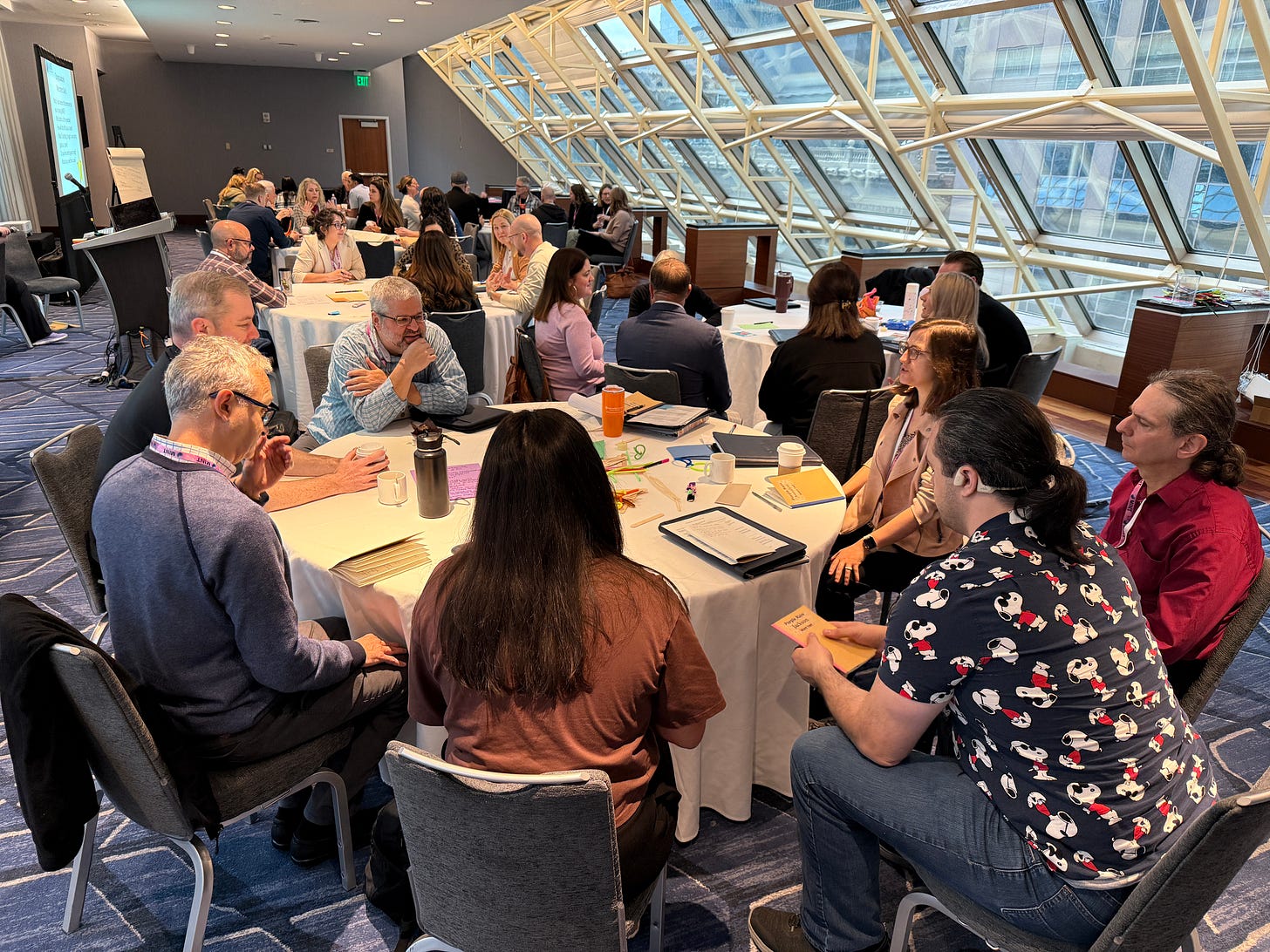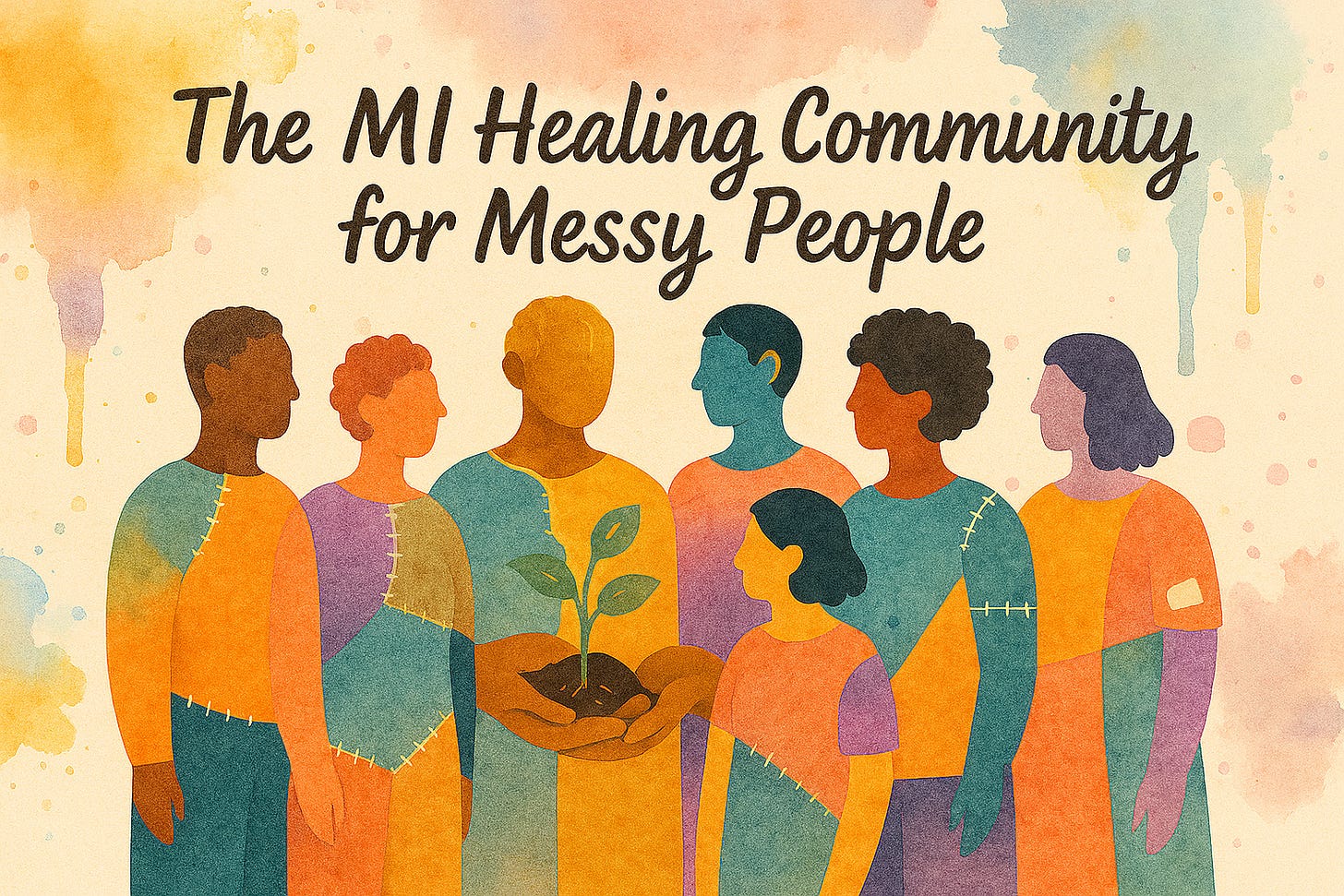DAY 100+ 30: Healing and Helping go Hand in Hand
It's not all abut technique, it's about knowing your triggers
Thanks for joining us today! I’m on the road, so
I will be doing a Subscribed Saturday video tomorrow.
Luckily, Sunday begins with an “S” so the aliteration continues! - Sky
Yesterday, on the last day of the MINT Forum, I was in a workshop with Bill Miller and Terri Moyers. The had set up an exercise where a trainer was playing the role of a Consulant working with a Helper who was stuck with a Client “who wouldn’t listen to him” and “was refusing to change.”
The person playing the Helper was doing a masterful job. Digging in, blaming the client, being certain. No curriouisty. No clinical humility. The person playing the Consultant tried several times to get the Helper to consider how they were contributing to the Client being stuck. The Helper was having none of it. And within moments, the Consultant was doing to the Helper what the Helper was doing to the Client: blaming them for the problem, trying to fix them.
We call this “Parrallel Process”
After five minutes of watching this painful tug-of-war, the Group that was watching were invited to consult with the Consultant. And guess what? Yup! The Group started to try to fix the Consultant, who was trying to fix the Helper, who was trying to fix the Client!
Wow! Double rainbow! Parallel Parallel Process!
Mirrors within mirrors within mirrors.
And it was also clear, that everyone involved with this frustrating fixing attempt … was getting exhausted.
Sometimes I wonder if helpers come to MI training because they’re secretly exhausted.
Helpers can easily get exhausted from clients who “won’t change.” Exhausted from feeling like we’re pushing rope. Exhausted from coming home with our blood boiling about that one conversation that triggered us.
If that’s you - if you’ve ever felt your jaw clench when a client says “yeah, but...” for the tenth time - hanging out in our MI learning community might be just the ticket.
Here’s what I’m learning from teaching MI
Workshops don’t create fluency. Practice doesn’t create fluency either.
Wait, Sky, what?! I know! But hold on …
What creates consistent fluency is healing your own relationship with change, with resistance, and the messy human process of transformation. This was we get to know and develop compassion for all the ways we get hooked.
That’s why MI training isn’t just about learning techniques. It’s about intention and healing. It’s about joining a community of helpers who are exhausted by pretending they have it all figured out.
And that’s why we have created this amazing Learning Community
A safe space for messy humans - Permission to struggle, fail, and learn without judgment
Your growth matters as much as your clients’ - Where we make room for with your ambivalence, your triggers
A Community that gets it - Other helpers who understand the weight of caring
A Sustainable practice - No overwhelm, no guilt about missing sessions, come when you can, and only when you want
You don’t have to have it all figured out. You just have to show up.
Hope to see you at our next meeting (but only if you want to!)
Sky
P.S. Not sure where to start? Our next class cycle begins soon:
MI Basics: Friday, Nov 7 - “Dropping the Rope on Control”
MI Intermediate: Friday, Dec 5 - “Healing Your Own Change Talk”
MI Advanced: Friday, Jan 9 - “The Power of Presence Over Technique”
Each class is spaced a month apart so you can anchor your learning in our free MI Practice Sessions - where we practice being with difficulty instead of fixing it.
Between now and our first class, come to a free practice session and feel what it’s like when helpers stop trying so hard.
Fair warning: If you’re looking for a quick certification, this might not be for you. But if you’re ready to transform how you show up - not just with clients, but with yourself - let’s do this together!
And Thank You Again!
100 More Days of MI is free. I’m super glad so many folks are enjoying the daily posts!
Offering your comments is free too, so please keep them coming! Send me an email or make a comment in the section below.
And if you would like to support these efforts, please consider becoming a paid subscriber.
Free MI Practice Sessions
Monday at 12pm ET (nyc time zone)
Fridays at 12pm ET (nyc time zone)
MI Practice Reserve Your Spot!
Free MI Snack (just a bite of MI)
Wednesdays at 11am ET (nyc time)
This week: Maintenance and Relapse
Sign Up. Here
Upcoming MI Classes
MI Basics: The Power of Listening, Fri, Nov 7, 2025
MI Intermediate: The Power of Change-Talk, Fri, Dec 5, 2025
MI Advanced: The Power of Whispers, Fri. Jan 9, 2025
These workshops are the perfect foundation
to get the most of our free practice sessions.
https://www.wv-mi.com/learning-mi
Registration for all three classes gets you 40% off the last one.
Email me for the code: skykershner@gmail.com
Pre-MINT TNT: Train the Trainer
Become a Guest Facilitator for our MI Practices Sessions
Interest List
We really are all in this together
Sky Kershner, LPC, ALPS, LCSW, DMin
Assistant Professor, WVU School of Medicine
MINT Certified Trainer of Motivational Interviewing
AAMFT Approved Supervisor / Member IEDTA / PACT L2
304-220-0088 / www.wv-mi.com / the mi-ai practice space







As a former CNA and now a Community Corrections Officer, I can honestly say the tug-of-war is real. Since joining your sessions, I’ve realized that we helpers often try to control the narrative, which leads to burnout fast. But here’s the truth: they are the captain of their own ship!
You asked, "If that's you - if you've ever felt your jaw clench when a client says 'yeah, but...'" - and yes, that was me. The old me.
As a life coach and crisis counselor, I noticed that most clients came to those first sessions simply to talk, to find a safe place where they could finally let everything out. But there I was, on the opposite end, my mind already racing: How can I guide them to the "correct" path? How do we not waste time - or their money? I can still feel that tension inside me, that urge to hurry toward the goal I'd set for the session. And I have to admit - it didn't work most of the time.
Even when clients promised to try what I suggested, I see now that many were just being polite. They didn't know how to say no to me. And I could feel the distance growing between us with each "assignment" I gave - physical, mental, spiritual. The more I prescribed, the wider the gap became.
I've finally learned to let go of my fixing mode. I've learned to relax, to focus instead on building trust, on creating that safe space, and on waiting to be invited into their journey. I don't have to do much for them - I just need to be there, on the same boat, riding the same waves.
For me, everything changed when I shifted from being the expert to being an active listener and supporter. When I placed empathetic understanding above offering answers. When I expanded the possibilities for action for both of us, not just for them. That shift changed everything in my sessions.